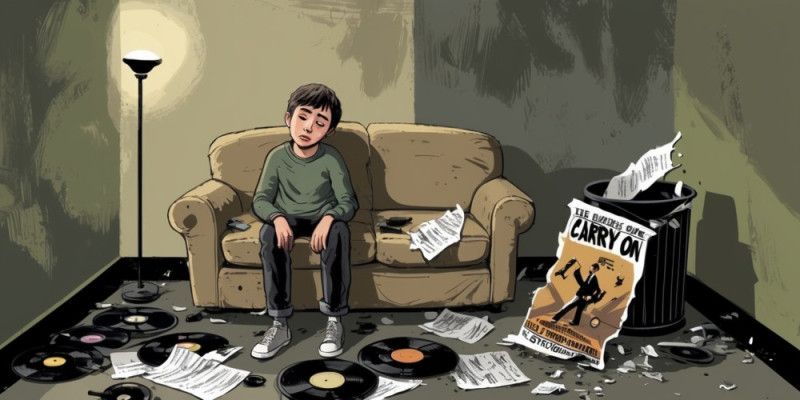Navigating Disappointment: A Dive into the Mediocrity of "Carry On"
- Landon White
- February 24, 2025

In the realm of cinematic experiences, few things can be more disappointing than a film that arrives with high expectations but fails to deliver. This is particularly accurate in the time of streaming platforms, where audiences are bombarded with choices that both excite and underwhelm. The recent Netflix release, "Carry On," epitomizes this struggle, offering a mix of familiar tropes and lackluster execution. With its attempt to blend action, comedy, and thriller elements, it’s left many wondering if it’s worth their time. Here, we delve deeper into the film’s premise, performances, and overall execution.
Plot Overview
""Carry On" centers on Ethan Kopek, a TSA officer played by Taron Egerton, who is on the verge of fatherhood with his girlfriend, Nora. The premise quickly becomes convoluted as Ethan receives ominous instructions from a mysterious figure known as "Traveler," voiced by Jason Bateman. Faced with the prospect of saving his loved ones from dire consequences, Ethan’s mundane life is turned upside down.
A Hero in Distress
The film introduces Ethan as a character riddled with self-doubt and stagnation. With dreams of becoming a police officer dashed after a rejection, his aspirations seem to have evaporated entirely. This setup gives Ethan a relatable backstory, framing his subsequent actions as those of a desperate man striving to reclaim his former ambitions.
The Voice of Manipulation
Bateman’s portrayal of the "Traveler" adds a layer of intrigue, as he serves as both the antagonist and a twisted guide for Ethan. The dynamic between Ethan and Traveler is initially engaging, filled with snarky banter and moments of sharp wit that showcase Bateman’s comedic prowess.
Video Game or Movie?

Ultimately, “Carry On” adopts a structure reminiscent of video game mechanics, where the protagonist must tackle various challenges laid out by the antagonist. This formula, while potentially engaging in other formats, loses its charm in the context of a feature film, leading to repetitive scenarios that fail to build genuine tension.
Script Issues
The writing, credited to T.J. Fixman, struggles to maintain the film’s momentum as it progresses. Although initially promising, the dialogue often veers into cliched territory, leading to moments that feel less like clever plot devices and more like tired tropes. Despite the involvement of a talent like Michael Green, whose previous works have received acclaim, the finished product leaves much to be desired.
Misplaced Creative Decisions
Helmed by Jaume Collet-Serra, recognized for his work in the action genre, "Carry On" at times feels like a collection of disparate scenes stitched together. The lack of cohesion results in a viewing experience that often feels disjointed, with characters and plot developments emerging seemingly at random.
Disappointing Supporting Characters
Another unfortunate aspect of "Carry On" is its inability to leverage its supporting cast effectively. Danielle Deadwyler, who portrays a homeland security agent, serves largely as a missed opportunity for deeper narrative exploration. Her character is relegated to the role of exposition rather than being given agency, making her presence feel more like an afterthought.
Comedic Moments
While the film tries to inject humor into the narrative, the comedic moments are hit-or-miss. Bateman’s signature style occasionally shines through, but it often feels forced within the context of the larger, more serious stakes facing Ethan. The tonal inconsistency results in moments that fail to land, leaving viewers feeling detached.
The Action Comes Up Short
Action sequences in "Carry On" were an opportunity for the film to redeem itself, yet they often fall flat. The pacing and choreography of these scenes lack the adrenaline rush commonly associated with thrillers. Whether it’s a poorly executed chase or an underwhelming standoff, the action fails to elevate the material.
Visual and Auditory Distractions
The visual presentation of the film also plays a role in its mediocrity. Cinematic choices that could have enhanced the suspense or action often feel generic or uninspired. Paired with an unmemorable score, the audiovisual aspect of the film does nothing to engage the audience’s senses in a meaningful way.
The Attempt at Suspense
An early build-up of suspense manages to hook viewers momentarily, but as the film progresses, it becomes apparent that this tension is fleeting. By the midpoint, the stakes feel diminished, and the narrative’s twists become predictable, reducing the thrill that a good thriller is supposed to maintain.
Questionable Logic
Several plot points in "Carry On" strain credulity, leading audiences to raise eyebrows at the suspension of disbelief necessary to enjoy the ride. For instance, the absence of rigorous security measures, such as TSA oversight, serves as a glaring oversight, rendering certain developments implausible.
Bland and Predictable Climax
As the film approaches its conclusion, the climax reflects the lack of originality that permeates the entire project. Viewers may find themselves anticipating moments that feel like recycled material from previous films, rather than fresh ideas that provoke genuine excitement or investment.
Final Thoughts
In summary, "Carry On" struggles to find its footing amidst a mixture of tired clichés, underdeveloped characters, and a narrative full of missed opportunities. The film offers some initial amusement and engaging performances from Egerton and Bateman, but it ultimately falls into the trap of mediocrity that is all too familiar in the crowded landscape of streaming content. As audiences sift through their options, "Carry On" may leave them wanting something more—a more cohesive, inventive, and thrilling cinematic experience.
Fans of the genre may find some moments to value, yet for those seeking a standout thriller, it might be wiser to select a different offering or revisit a classic.















